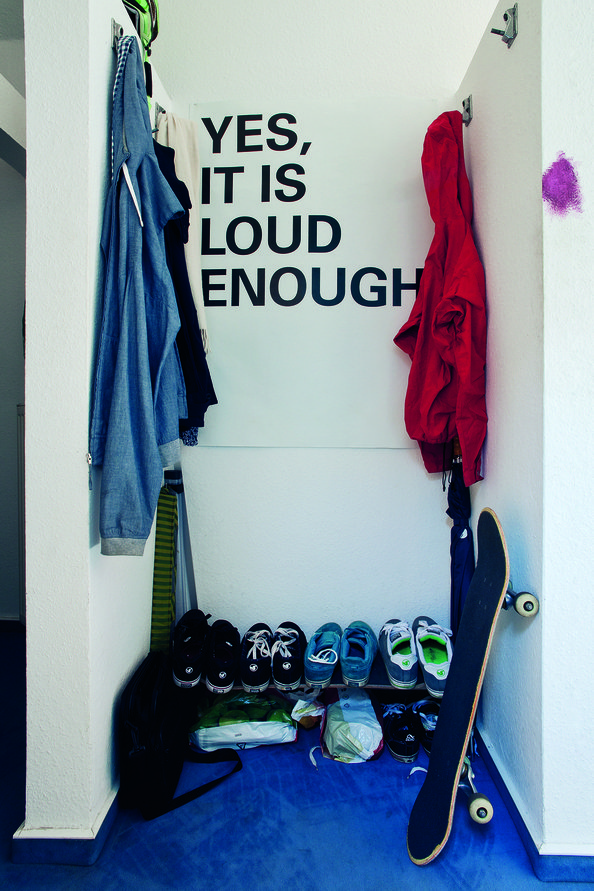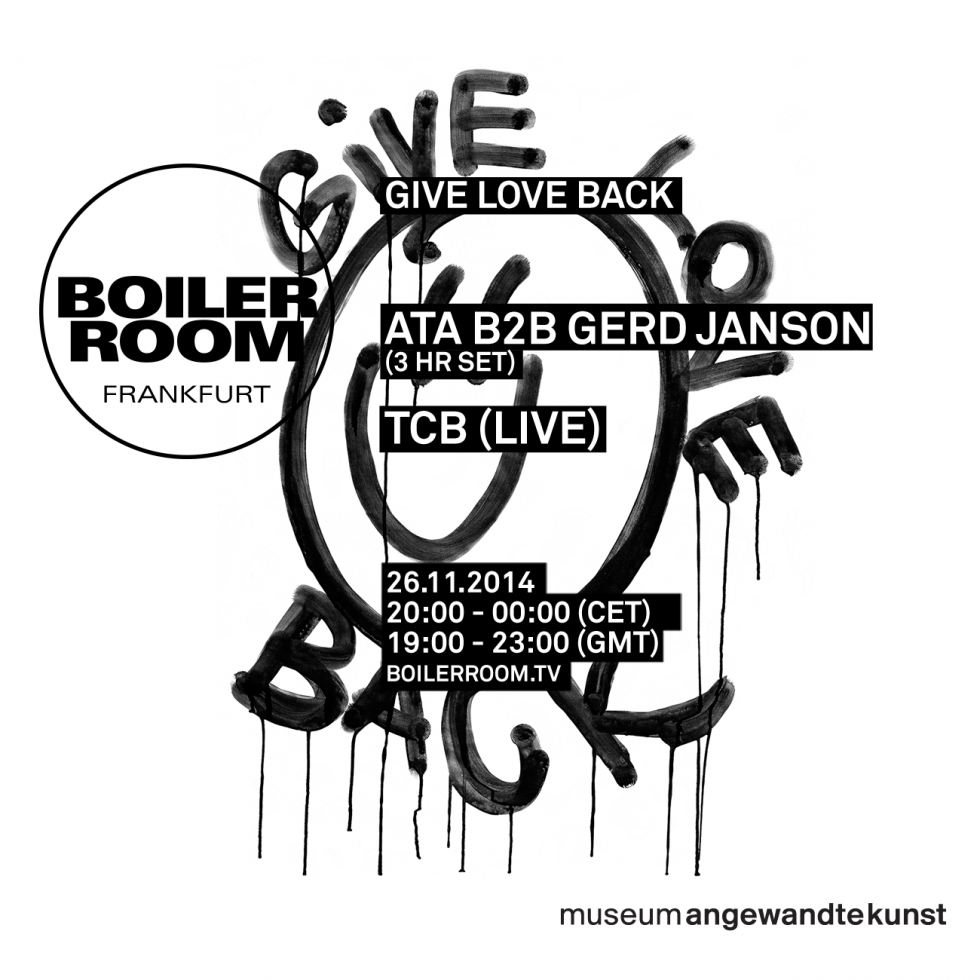
“Give Love Back”. For some club proprietors and promoters, this might be something said after years. For Ata, however, it’s just what he’s always done. He’s long amalgamated various passions into his activities, and these have in turn spilled out in multiple directions. A key initial tenet of the legendary Frankfurt club Robert-Johnson’s founding in 1999 was to establish a place where well-made food could be served to friends and family in a comfortable, comely atmosphere. Little has truly changed even as the stature of the fabled Offenbach space has risen and risen, and the list of DJs feeling an intrinsic familial connection to it grows ever deeper.
It all feeds back into a self-ascribed “Ata-Prinzip” [“Ata’s Principle”] – at heart, creating a conducive environment for other people’s enjoyment, no matter the discipline. That same consideration and keen attention to detail translates to his four month Give Love Back residency at Museum für Angewandte Kunst (MAK) which examines the roles of industry, consumption and culture as both separate and related entities. The process of creation, say curators Eva Linhart and Mahret Kupka, is every bit as important as the final execution.
As well as reflecting on years of design and records tied to Ata’s own life, Give Love Back will encompass so much more: a family-friendly Christmas market; panel discussions expanding upon topics such as the legacy of Krautrock and the importance of waste removal (no, seriously); even a tattoo parlour. Plus a Boiler Room session, natürlich, featuring one of Ata’s closest companions, Mr Gerd Janson.
Gerd & Ata share a similarly mischievous sense of self-effacing humour. They have enough skin in the game to, if not reject, then playfully mess with both the fripperies and the more serious aspect of the club culture they inhabit. So it made perfect sense to get the pals to engage in a back’n’forth about Ata’s taste in tables and teas, gradually backing away from club culture, and how food rules everything around him.
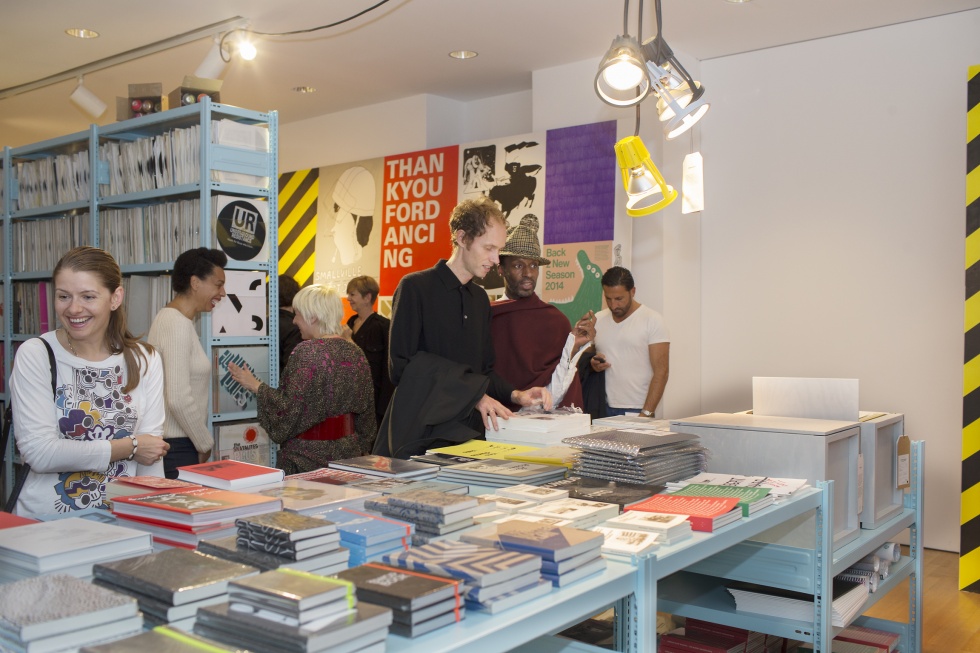
GABRIEL SZATAN: The exhibition encompasses multiple strands, so there’s a lot to grip here…
GERD JANSON: Well, I’m amazed again by Ata’s attention to detail, so the first question is how did you find all this stuff?
ATA: So yes, the exhibition has three parts. One of the parts is the concept store – which we’re speaking inside at the moment – and this houses all the stuff that you can buy around the world which I like. A lot of the editions are pieces of work that friends have put together. We’d meet and ping-pong ideas; just like you would if you were in a recording studio.
GJ: And with regards to the kind of stuff I’m looking at here, for instance? The French trash cans, the industry shelves and so on.
A: As a DJ, you drive around the whole world to get a lot of inspiration. Whether it’s in London, Paris, New York or Tokyo, I go around and check out the shops. All that you see here are things I’d actually love to have in my home. Some things are really expensive. You know German Schnapps? We did a collaborative, special edition for that. Then we did a lot of small things like tables and a mirror ball. We connected with Adidas to do some shoes. Kitchens, perfumes, special teas, Japanese toys, Jeremy Scott designs for Adidas. We truly have everything here: all the things you need for a better living.
We also have a big square housing posters, photos and gadgets that we did for Robert-Johnson. It’s an installation by eight visuals operated by a joystick, which you can use to track all the years and see what we’ve done through photos that no-one has seen before. Outside of the installation, you can see the old wallpaper printing from our man who was at Robert-Johnson every Friday for three years taking pictures of people. Sometimes he would just take photos that flashed up in your face, but the work was great; we created this wallpaper so people can understand what’s been happening here.
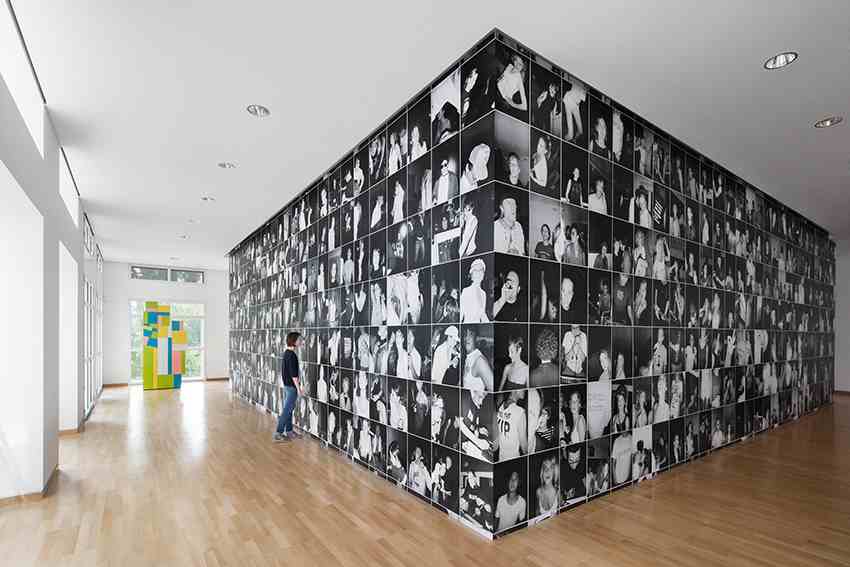
GJ: You can buy a piece of the old Robert-Johnson dancefloor which was broken by too much dancing. You can also buy Ata’s record collection.
A: Yeah, but we sold out the record collection.
GJ: How can a DJ of your experience even think to sell?
A: It was strange in the beginning, but after 30 years of working with records and moving them four or five times throughout my life, the funny thing is that they were always in the basement. I’ve had a couple of problems with my back these past five years, so I decided to play a lot of cities the digital way, and just a couple of records. I wanted to move out of Germany, so the next problem on top was where I was going to move all these records to. You can find anything you want on the Internet these days anyways. Discogs is my new church for stuff that I love to play all the time because I can keep my collection small.
GSz: Gerd, you edited Come On In My Kitchen, right?
GJ: Uh huh, I was part of the team.
GSz: So Ata, when you’re thinking of these artistic pursuits outside of music, do you always reach to Gerd as your right hand guy?
A: Mostly, yes. I’ve known him for a very long time and he was one of the first residents here. For me, he’s one of my favourite young DJs…”young”. I love to play with him because he’s also a cool guy. We’ve never done anything together in Frankfurt and now we’re doing Boiler Room so I’m looking forward to having some fun.
GJ: With the exhibition, I wasn’t involved in any way bringing the exhibition together, but that’s also because there wasn’t much writing to be done. It was almost a given that Ata asked for my help with the book as I used to be a music journalist and writer.
A: He knows me well in terms of what I like and what I don’t like. We’ve worked for one and a half years to build the exhibition and now it’s up and successful. We’ll continue to have fun right until January 11.
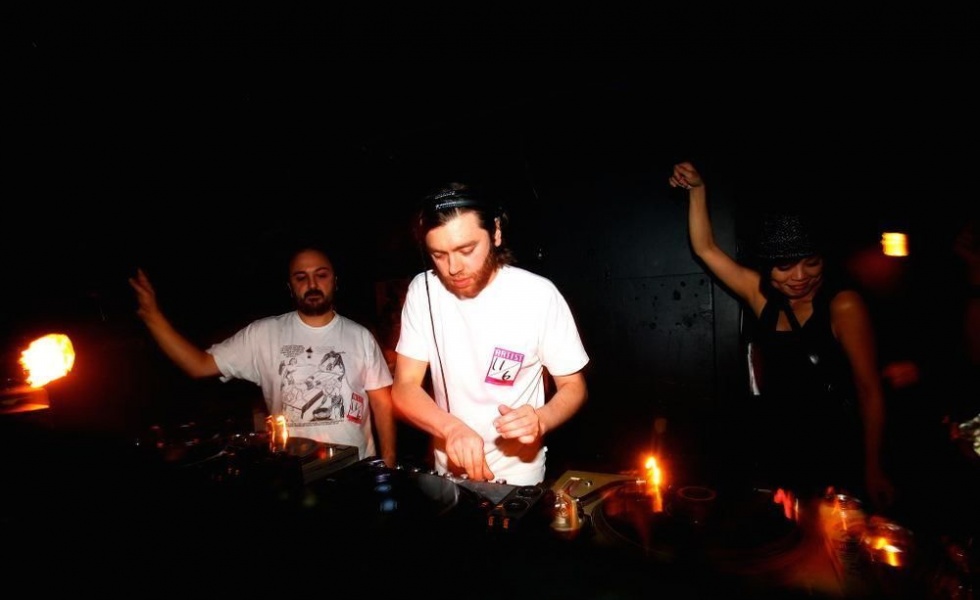
In more youthful times.
GSz: Are you going to have mixed feelings when the exhibition is done?
A: No – if it’s finished, it’s finished. We’ve done a lot of work to this day, and after January 11 we’ll have two more weeks of hard work to put everything back into the warehouse. Then, four weeks of holiday and to check out what’s happening in Sardinia.
GSz: Are you going to get a tattoo?
A: Aha, how did you know! I’ve never wanted to have a tattoo, but this Saturday I’m getting my first and last tattoo.
GSz: Any idea what it’s going to be yet?
A: Of course. My friends will say that I’m stupid for doing this but I want to get the name of my girlfriend, Susanah. I’ll be having an sailor-style anchor on the inside of my bicep [Laughter from Gerd]. It’s a really fucking stupid tattoo.
GJ: If it ever breaks down, you can always say it was about the Toto song called “Susanah”…
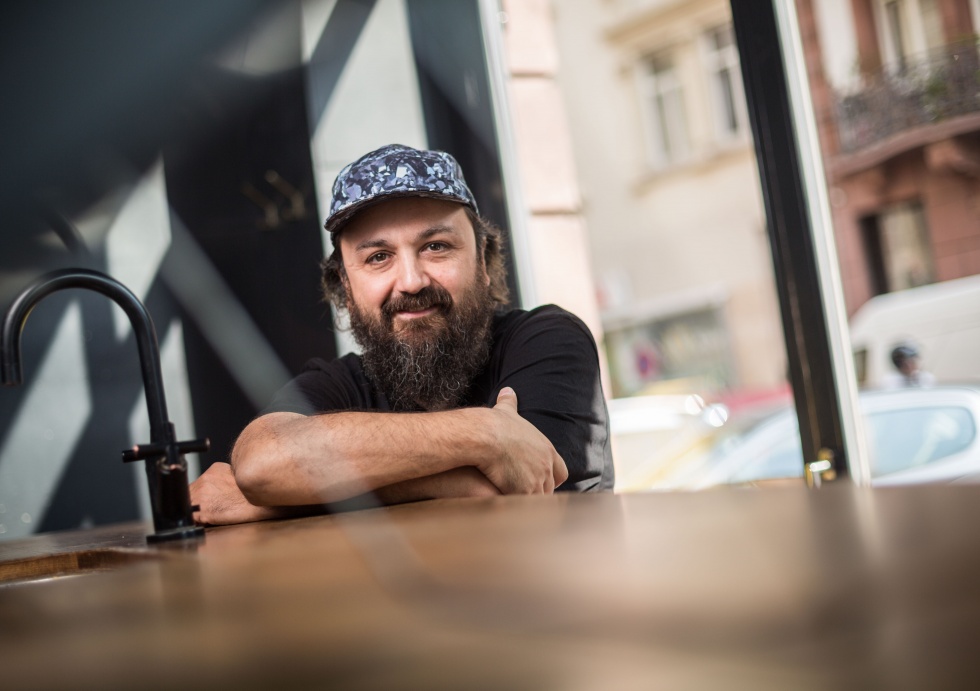
Ink free (for now)
GSz: I read a piece in Groove Magazine that asked you whether it was weird that you’re hosting our broadcast within the museum. Your answer was a clear no, because it feeds into the wider picture.
GJ: You’ve always worked on the cutting edge of music, art and fashion so for you it was like a conglomeration of pop culture.
A: If you are interested in good music, you’re also interested in good art and good things. If you see Andrew Weatherall or Ivan Smagghe, they have a really special taste in tattoos or places to eat for, for example.
GSz: Even down to what they’re wearing; it’s all an aesthetic consideration.
GJ: It’s totally special. But still, being asked by a museum to exhibit Ata’s world of merry things must be strange. Was it surprising that you were asked?
A: Yeah, for me it was surprising that they said what I do with Robert-Johnson, Club Michel and Plank Bar is a different way to set up a club, restaurant or a bar. The question was, “why am I doing this, and why am I doing it this certain way?” For me, that is the question of applied art. I never opened the club to make money. It was open first to celebrate music, equality, the dancefloor and the soundsystem. Only at the end of it all should you work out what you can drink at the bar. Quality is everything. It’s a different way of working but it’s also very successful.
GJ: Now you’re wrapping up the exhibit soon and you’ve sold your record collection, you’re able to cherry-pick gigs. What are you going to do with your life in Sardinia?
A: I’m going to be a fucking farmer. The most important thing in the future is food for my children and friends. The house that we’ve bought is an old farmer’s house, so we’re going to make a big renovation with 40,000 square metres of garden. We’re going to make food for ourselves and our friends.
GJ: So is it all going to be organic food?
A: Yeah, of course.
GJ: Plus maybe a boutique hotel?
A: Yeah, maybe a boutique hotel. A mobile private hotel. You won’t be able to find out about it on the internet, only word of mouth. I’ll be DJing for the next four or five years and then I’ll finish. I’ll have a good connection between Calgary, Roma or Frankfurt as well as my three baby projects in Frankfurt. There’s a perfect team to carry it on. But yes: four or five years, then that’s it.
GJ: So you won’t open a restaurant in Sardinia?
A: No, because normally the house is really where you go back for the mind and soul. So it’s a retreat. But I’m not a guru…
GJ: You do have guru-like qualities.
A: We all do. I think what’s important to me is to have animals with me to show my children something different from the big city.
GSz: It’s almost gone fully cyclical. When founding Robert-Johnson, weren’t you mainly after somewhere to sit down and drink a nice coffee? So all these years later, nothing’s truly changed. You just want to have a pleasant meal, that’s all.
A: [Laughs] I’m 46 years old now, so what else am I going to do? Stay in the city and just drink alcohol, smoking cigarettes and getting fucked up? No. no. The best thing I can do with these years of my life is go out of the city and have some fun with the animals and enjoy nature.
Thankfully, we’ll be fortunate enough to get Ata on our screens before the process of weaving daisies into his beard begins. Head HERE for more info.
